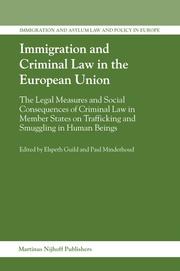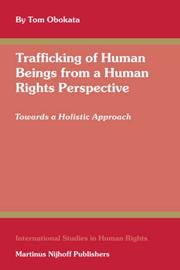| Listing 1 - 3 of 3 |
Sort by
|
Periodical
ISSN: 19808585 22379843 Year: 2006 Publisher: Brasília, DF, Brasil : Centro Scalabriniano de Estudos Migratórios : Editora CSEM
Abstract | Keywords | Export | Availability | Bookmark
 Loading...
Loading...Choose an application
- Reference Manager
- EndNote
- RefWorks (Direct export to RefWorks)
Emigration and immigration --- Migration, Internal --- Labor mobility --- Human trafficking --- Emigration. --- Immigration. --- Labour. --- Internal migration. --- Emigration and immigration. --- Human trafficking. --- Labor mobility. --- Migration, Internal. --- Government policy --- Government policy. --- contemporary human mobility --- Internal migration --- Mobility --- Population geography --- Internal migrants --- Mobility, Labor --- Labor supply --- Labor turnover --- Forced prostitution (Human trafficking) --- People trafficking --- Sex trafficking --- Traffic in persons --- Trafficking in human beings --- Trafficking in persons --- White slave traffic --- White slavery --- Sex crimes --- Immigration --- International migration --- Migration, International --- Assimilation (Sociology) --- Colonization --- White slave traffic (Human trafficking) --- White slavery (Human trafficking) --- Offenses against the person

ISBN: 9004150641 9789004150645 9786611398668 1281398667 9047409302 9789047409304 9781281398666 661139866X Year: 2006 Volume: 9 Publisher: Leiden ; Boston : Martinus Nijhoff Publishers,
Abstract | Keywords | Export | Availability | Bookmark
 Loading...
Loading...Choose an application
- Reference Manager
- EndNote
- RefWorks (Direct export to RefWorks)
This is a study of the legal framework on criminal measures on trafficking and/or smuggling and facilitating illegal entry in six Member States: France, Germany, Italy, the Netherlands, Spain and the UK, and the European Union. This issue is at the nexus of migration and criminal law. The system of criminal law in the Member States is a central part of the balance of the powers of the authorities and the rights of the citizen. The way in which civil liberties of the individual are weighed in comparison with public protection duties by the authorities is in essence a constitutional issue. The treatment of foreigners, in particular as regards their entry onto the territory and residence is not part of the constitutional settlements, but a field governed by state discretion and exceptionalism. The rules and administrative measures regarding entry, residence and expulsion of foreigners is not subject to the same civil liberties guarantees of due process as apply in criminal law. This comparative study examines how, in each Member State, the insertion of immigration into criminal law takes place. Do the rules of criminal law in respect of due process take precedence over the lower evidential and procedural requirements which are applied in the field of immigration? How does the criminal justice system deal with this new field where central constitutional issues are not present? There are two levels on which the insertion of immigration into criminal law takes place – the legal and the social. This book deals with both. On the one hand it looks at the laws and the court decisions on criminal trials in respect of immigrants for immigration related offences, on the other hand it looks at how the society (political actors, media, interest groups etc) discuss and develop this issue. This book is designed for policymakers, academics, students and activists concerned about the European Union.
Human smuggling --- Human trafficking --- Illegal aliens --- Migration. Refugees --- Human rights --- Criminal law. Criminal procedure --- Criminology. Victimology --- European Union --- Emigration and immigration law --- Emigration et immigration --- Trafic de migrants --- Immigrants clandestins --- Prevention --- Droit --- Prévention --- Illegal immigration --- Prevention. --- Noncitizens --- Illegal immigration. --- Children of illegal aliens --- Illegal alien children --- Irregular migration --- Unauthorized immigration --- Undocumented immigration --- Women illegal aliens --- Emigration and immigration --- Noncitizen detention centers --- Aliens --- Enemy aliens --- Expatriates --- Foreign population --- Foreign residents --- Foreigners --- Illegal immigrants --- Non-citizens --- Resident aliens --- Unauthorized immigrants --- Undocumented aliens --- Undocumented immigrants --- Unnaturalized foreign residents --- Persons --- Forced prostitution (Human trafficking) --- People trafficking --- Sex trafficking --- Traffic in persons --- Trafficking in human beings --- Trafficking in persons --- White slave traffic --- White slavery --- Sex crimes --- Immigrant smuggling --- Migrant smuggling --- People smuggling --- Smuggling --- Legal status, laws, etc. --- Human smuggling - Europe --- Human trafficking - Europe --- Illegal aliens - Europe --- White slave traffic (Human trafficking) --- White slavery (Human trafficking) --- Offenses against the person

ISBN: 9004154051 9786611400682 1281400688 9047411064 9789004154056 9789047411062 9781281400680 6611400680 Year: 2006 Volume: 89 Publisher: Leiden, The Netherlands ; Boston : Martinus Nijhoff,
Abstract | Keywords | Export | Availability | Bookmark
 Loading...
Loading...Choose an application
- Reference Manager
- EndNote
- RefWorks (Direct export to RefWorks)
Trafficking of human beings is a widespread practice in the modern world. It has been estimated that between 600,000 and 800,000 people, the majority of whom are women and children, are trafficked worldwide each year. The rapid growth in trafficking of human beings and its transnational nature have prompted the international community to take urgent action, and a major step was taken when the United Nations adopted the Protocol to Prevent and Suppress Trafficking in Persons, Especially Women and Children (Trafficking Protocol), attached to the United Nations Convention against Transnational Organised Crime (Organised Crime Convention) in December 2000. Yet addressing the human rights aspects of the phenomenon has proven to be difficult in practice, and so far a holistic approach which addresses wider issues surrounding the phenomenon has not been taken. The purpose of this book is to go further than simply recognising that trafficking is a human rights issue. It attempts to establish a human rights framework to analyse and address the act by identifying applicable human rights norms and principles from the beginning to the end of the trafficking process, such as the rights to life, work, health, as well as freedom from torture and slavery. It then articulates key obligations under international human rights law, including the obligations to prohibit trafficking, punish traffickers, protect victims, and to address the causes and the consequences of the practice.
Forced labor --- Women --- Children --- Transnational crime --- Human trafficking --- Victims of crimes --- Human rights --- Prevention --- International cooperation --- Crimes against --- Law and legislation --- Protection --- Law --- Social problems --- International relations. Foreign policy --- Social policy --- Sociology of the family. Sociology of sexuality --- United Nations --- European Union --- Poland --- Thailand --- Great Britain --- Transnational crime. --- Human trafficking. --- Human rights. --- Basic rights --- Civil rights (International law) --- Rights, Human --- Rights of man --- Human security --- Transitional justice --- Truth commissions --- Crime victims --- Victimology --- Victims --- Forced prostitution (Human trafficking) --- People trafficking --- Sex trafficking --- Traffic in persons --- Trafficking in human beings --- Trafficking in persons --- White slave traffic --- White slavery --- Sex crimes --- Multinational crime --- Transborder crime --- Crime --- Crimes against women --- Femicide --- Women victims of crime --- Compulsory labor --- Conscript labor --- Labor, Compulsory --- Labor, Forced --- Employees --- International cooperation. --- Crimes against. --- Protection. --- Forced labor - Prevention - International cooperation --- Women - Crimes against --- Children - Crimes against --- Human trafficking - Law and legislation --- Victims of crimes - Protection --- White slave traffic (Human trafficking) --- White slavery (Human trafficking) --- Offenses against the person --- International --- International organisations --- Government policy --- Legislation --- Book
| Listing 1 - 3 of 3 |
Sort by
|

 Search
Search Feedback
Feedback About
About Help
Help News
News